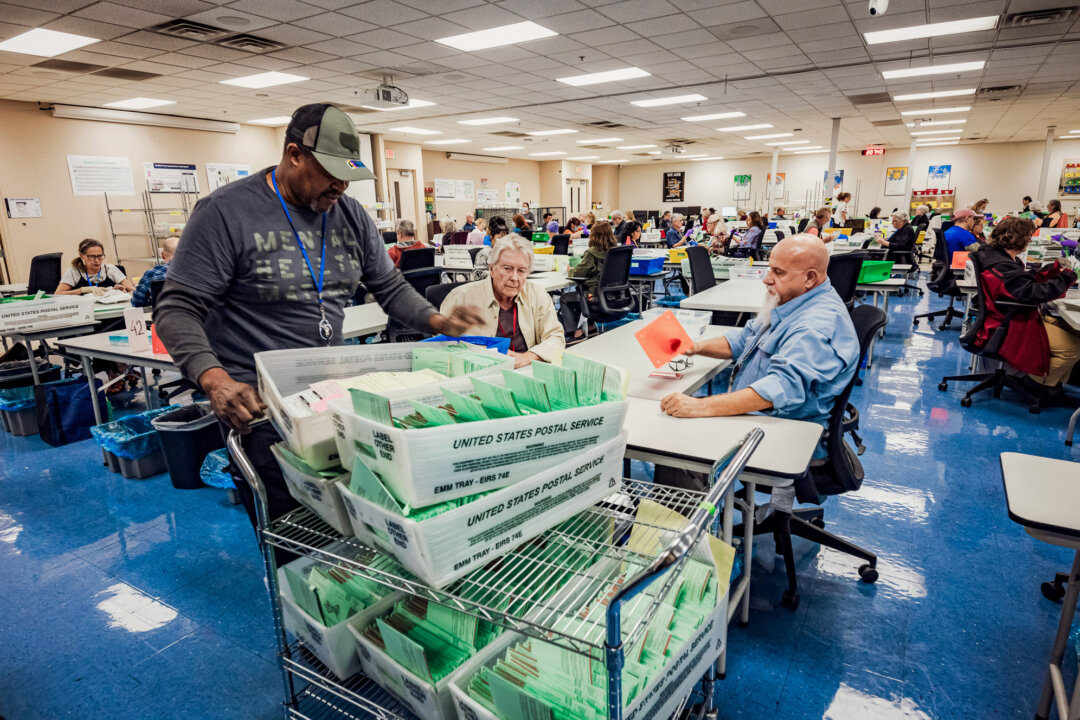Unofficial results will trickle in soon after polls close, but it could take days or even weeks to determine the winner if the results are extremely close.
As polls close on Nov. 5, Americans will be eager to learn the result of the presidential election. Sometimes experts are able to accurately predict a winner on election night or early the next day, usually when the result is lopsided.
In close elections, it can take several days—even weeks—to find out who won. Here’s what we’ll be watching on election night, and when both unofficial and official results may be available.
What Are the Battleground States?
Battleground states—also called swing states—are those that will likely determine the which presidential candidate wins the White House, depending which way they swing.
Technically, that’s true of all states. Yet some states have reliably favored one party or the other for decades, so there’s little doubt about who will win in 2024.
This year polling suggests that either presidential candidate could win in Arizona, Georgia, Pennsylvania, Michigan, Nevada, North Carolina, and Wisconsin.
Watch for results in these states, which are likely to be decisive in the 2024 election.
When Are Results Announced?
Expect states to begin announcing results very soon after their polls close, then look for updates throughout the evening. The Epoch Times website will track election results in real time.
Poll closing times range from 6 p.m. ET in parts of Indiana and Kentucky to midnight ET in Alaska and Hawaii.
Polls close in Georgia at 7 p.m., North Carolina at 7:30 p.m., Pennsylvania and Michigan at 8 p.m., Arizona and Wisconsin at 9 p.m., and Nevada at 10 p.m. All times are stated in Eastern Time.
Those first results are unofficial, or preliminary, results. And early returns can be misleading because they represent a small portion of a state’s voters. Precincts with larger populations generally take longer to count, and mail-in ballots can take longer still because the voter’s identity must be verified. Some states allow for mail-in ballots to arrive and be counted after Election Day.
Who Declares the Winner?
Some news organizations, such as The Associated Press (AP), have developed systems for forecasting a winner based on initial returns.
According to the AP, that comes down to analyzing the known vote tallies and asking: Is there any scenario in which the trailing candidate can catch up?
When they are satisfied that the answer is no, they project the winner.
Those forecasts are merely predictions, however. Only Congress can declare the winner of a presidential election. More on that below.
Will We Know the Winner on Election Night?
Accurately predicting the winner on Election Day is possible only when one candidate leads by a wide margin. If the race is close, as it appears to be this year, it may take days to forecast the results.
In 2016, the AP declared Donald Trump the winner at 2:29 a.m. ET on Nov. 9, less than three hours after the last polls closed.
But in 2020, the AP didn’t declare Joe Biden the winner until 11:26 a.m. ET on Nov. 7, four days after Election Day.
Many states have worked to speed up the process this year by using ballot-counting machines and implementing rules to allow early votes to be tabulated before Election Day.
In Michigan, for example, Secretary of State Jocelyn Benson estimates that unofficial election results will be available by the end of the day on Nov. 6.
In Nevada, where more than three-quarters of votes were cast early in the 2020 election, early vote counting cannot begin until 8 a.m. on Election Day.
What Happens If One Candidate Concedes?
Sometimes a candidate will concede defeat when there appears to be no hope of winning. That can happen as early as election night. In 2008, John McCain conceded to Barack Obama before midnight on Nov. 4.
In close races, neither candidate may concede for weeks, if at all.
In 2000, Vice President Al Gore initially conceded defeat shortly after the polls closed but retracted his statement when additional returns showed the race in Florida was too close to call.
After losing a court battle concerning the Florida recount, Gore conceded a second time on Dec. 13.
Concession speeches are not legally binding, however. The outcome of a presidential race is determined by the electoral process, not the candidates themselves.
When Will the Results Become Official?
States perform an audit—often called a canvass—of the election results before certifying them as accurate and final.
Michigan’s certification is scheduled for Nov. 22 and North Carolina’s for Dec. 26.
The latest date certification can occur in other battleground states is as follows: Georgia, Nov. 23; Nevada, Nov. 26; Wisconsin, Dec. 1; Arizona, Dec. 2.
Pennsylvania does not have a specified state deadline for certification of election results, but governors in all states must issue Certificates of Ascertainment designating electors to the Electoral College by Dec. 11.
Electors in each state will meet in their state capitols on Dec. 17 to cast the Electoral College votes.
The final certification will occur on Jan. 6, 2025, when the U.S. Congress meets in a joint session to count the electoral votes.

